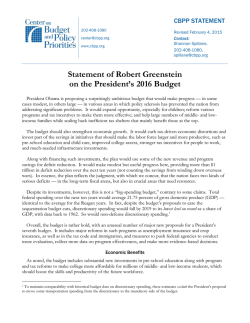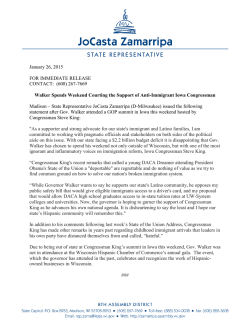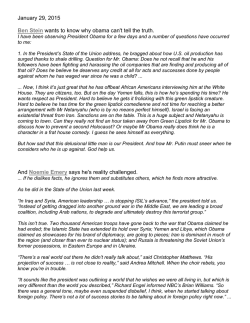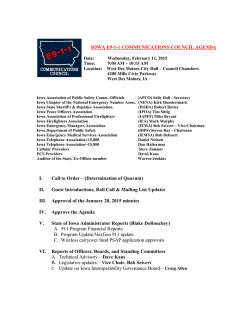
February 2, 2015 We have a couple of subjects today
February 2, 2015
We have a couple of subjects today; Netanyahu's coming visit and some peeks at the
GOP 2016 race. First Roger Simon posts on "Big Bad Bibi."
Fee fi fo fum. Big bad Bibi is coming to DC town — and Barack is VERY angry. Not only that, and
possibly worse, Jeffrey Goldberg at The Atlantic may be equally as angry. The journalist insists
Netanyahu making a speech to Congress at the speaker’s invitation is a “disaster” or — in the
words of my grandmother — “not good for the Jews.” And Jeff should know. He’s an important
guy, I am told. He gets to talk… to Barack.
Goldberg accuses Netanyahu of electioneering (a rare thing indeed for a politician) and not
showing the proper “RESPECT” for our president (cue Aretha), who always demonstrates so much
respect for the Israeli prime minister.
Excuse me while I rend my clothes. Meanwhile, lost in Goldberg’s posturing, and the funfkeying by
such great State Department intellects as Jen Psaki, is the subject of Netanyahu’s putative
speech. What was it? Oh, yes… Iran. Now I remember. That country that has its hand in nearly
every piece of Islamic mayhem from Buenos Aires to Sanaa. ...
... And I’m sorry again to be so hostile to Goldberg and his “liberal” ilk, but I’m having echoes these
days of 1938. Another Kristallnacht hasn’t quite happened yet, but we’ve come mighty close.
Time’s up for being polite. Protocol-shmotocol. Benjamin Netanyahu isn’t the problem. Barack
Obama is.
William Kristol on the president's Israel problem.
The Obama administration is angry with Israel. Here's the administration's house organ, the New
York Times, this morning:
"WASHINGTON — The Obama administration, after days of mounting tension, signaled on
Wednesday how angry it is with Israel that Prime Minister Benjamin Netanyahu accepted
Republican leaders’ invitation to address Congress on Iran without consulting the White House.
The outrage the episode has incited within President Obama’s inner circle became clear in
unusually sharp criticism by a senior administration official who said that the Israeli ambassador,
Ron Dermer, who helped orchestrate the invitation, had repeatedly placed Mr. Netanyahu’s
political fortunes above the relationship between Israel and the United States.
The official who made the comments to The New York Times would not be named..."
Of course, the official who last summer called Prime Minister Netanyahu a "coward" and a
"chickens--t" would not be named either. But there is no reason to think those unnamed angry
officials do not speak for an angry president.
The Obama White House usually prides itself on not getting angry. Its self-image is that it's cool,
calm, and collected. And it doesn't get angry at, for example, the Islamic Republic of Iran. The
Obama White House understands and appreciates the complexities of the Islamic Republic's
politics and history. It is only with respect to the Jewish state that the Obama White House is
impatient, peremptory, and angry. ...
... So we have an angry president, increasingly desperate for vindication of his failed foreign policy,
accelerating both his appeasement of Iran and his attacks on Israel. The good news is that the
Republican party and the conservative movement—and most of the American people—stand with
Israel and against President Obama. Of major parts of the American Jewish community, on the
other hand, one can say no such thing.
Jennifer Rubin has more
... Other Israel watchers speculate that this is really a ham-handed way of interfering with Israel’s
elections by giving fuel to Netanyahu’s opponents, who argue that he cannot get along with the
United States. This would be par for the course for an administration that has strained to topple the
Israeli government. Its offense? It simply refuses to knuckle under to administration bullying or go
quietly as the United States appeases Iran, an existential threat to the Jewish state.
Ironically, the scuffle comes just after Iranian-backed Hezbollah terrorists killed two Israeli soldiers,
reminding us that Iran is on the march throughout the region and that the Iranian government with
which Obama hopes to achieve a grand reconciliation is committed to Israel’s destruction.
To sum up, the administration uses Tehran’s talking points to decry passage of a sanctions bill that
would go into effect only if Iran refused to make a deal by June along the lines the administration
itself outlined. It attacks the leadership of our democratic ally Israel (which it tried to undermine in
cease-fire talks at the end of the Gaza war by adopting the plan of Hamas’s patron Qatar) and
refuses to meet with its elected leader when he visits. To boot, the administration throws a fit that
Congress invited him to speak — all to give Netanyahu’s opponents back home fodder for their
election campaign. At least there is no doubt this is the most anti-Israel and immature White House
in history. ...
Changing subjects, John Fund reviews last week’s Iowa GOP confab.
... The field this cycle is the most open and competitive I’ve ever seen. Traditionally, Republicans
have picked as their nominee the candidate who placed second in the most recent competitive
nomination contest (the "it’s your turn" mentality). Think Ronald Reagan in 1980, George H. W.
Bush in 1988, Bob Dole in 1992, John McCain in 2008, and Mitt Romney in 2012. This year is
different. The number-two candidate in 2012 was former Pennsylvania senator Rick Santorum;
even though he might run again, he isn’t accorded first-tier status for 2016.
Clear winners and losers emerged from the marathon ten-hour session of back-to-back speeches
that was hosted by Citizens United (the group at the center of the famous Supreme Court case)
and Iowa congressman Steve King.
Here’s the rundown.
WINNERS Scott Walker — The Wisconsin governor proved he can be a dynamic speaker,
striding the stage in shirtsleeves and demonstrating Midwest sensibilities that connected him to his
Iowa audience. Who knew that he’d lived in Iowa until the third grade or that he was an expert
coupon clipper at Kohl’s, a well-known regional department-store chain? Walker made a strong
case for electability: "I’ve won the race for governor three times in the last four years — three
times, mind you, in a state that hasn’t voted Republican for president since I was in high school 30
years ago." Everyone knew Walker had triumphed in his hard-fought battles against the state’s
public-sector unions. After his speech this weekend, Iowa audiences will clearly now get the rest of
the Walker story. ...
Matt Lewis says conservatives want someone like Scott Walker who prevails without
caving.
... What we really crave is a conservative winner who doesn't cave. And Scott Walker is very
arguably that guy.
He won in 2010. He picked a fight with Big Labor and won. He survived a recall. And he won
again in 2014 — by almost the same margin as he did in 2010. That's three wins in four years for a
man who governed as a conservative reformer in a state that the Republican presidential nominee
hasn't carried since 1984. As Taegan said, Walker is a winner who doesn't cave.
Other conservative "fighters" may try to frame fighting the good fight (and losing) as the highest
virtue, but fighting and winning is vastly superior. And on that count, Scott Walker took on the
unions — and won. ...
Instapundit posts on a Bloomberg News piece on Walker's surge in Iowa polls.
Wisconsin Governor Scott Walker is surging, former Florida Governor Jeb Bush is an also-ran and
former Secretary of State Hillary Clinton is dominating in a new poll of Iowans likely to vote in the
nation’s first presidential nominating contest.
The Bloomberg Politics/Des Moines Register Iowa Poll, taken Monday through Thursday, shows
Walker leading a wide-open Republican race with 15 percent, up from just 4 percent in the same
poll in October. Senator Rand Paul of Kentucky was at 14 percent and former Arkansas Governor
Mike Huckabee, who won the Iowa caucuses in 2008, stood at 10 percent.
Bush trailed with 8 percent and increasingly is viewed negatively by likely Republican caucusgoers. New Jersey Governor Chris Christie is in even worse shape, with support from just 4
percent. More troubling for Christie: He’s viewed unfavorably by 54 percent, among the highest
negative ratings in the potential field. At 9 percent, retired neurosurgeon Ben Carson pulls more
support than either Bush or Christie. ...
Interesting dose of humility from Michael Barone about the surprises already in the
2016 race. He closes with this Hillary zinger.
... There’s not much policy guidance either from Hillary Clinton, who currently towers above
potential rivals — Jim Webb, Bernie Sanders, Martin O’Malley — for the Democratic nomination.
Mike Allen of Politico has a typically well-sourced preview of the Clinton campaign effort, chock full
of names of experienced advisers and the 1970s singer Carole King.
But the tipoff comes in the last sentence: “Now that the architecture of the campaign is clear, the
two [advisers] are helping with the next critical task: developing her message.”
Oh, that. My mistake: I thought she’d have developed one by now.
Roger L. Simon
Big Bad Bibi
Fee fi fo fum. Big bad Bibi is coming to DC town — and Barack is VERY angry. Not only that, and
possibly worse, Jeffrey Goldberg at The Atlantic may be equally as angry. The journalist insists
Netanyahu making a speech to Congress at the speaker’s invitation is a “disaster” or — in the
words of my grandmother — “not good for the Jews.” And Jeff should know. He’s an important
guy, I am told. He gets to talk… to Barack.
Goldberg accuses Netanyahu of electioneering (a rare thing indeed for a politician) and not
showing the proper “RESPECT” for our president (cue Aretha), who always demonstrates so much
respect for the Israeli prime minister.
Excuse me while I rend my clothes. Meanwhile, lost in Goldberg’s posturing, and the funfkeying by
such great State Department intellects as Jen Psaki, is the subject of Netanyahu’s putative
speech. What was it? Oh, yes… Iran. Now I remember. That country that has its hand in nearly
every piece of Islamic mayhem from Buenos Aires to Sanaa.
Oh, wait. I made another mistake. I said Islamic mayhem. That’s a no-no for Goldberg’s hero. I
meant, um, “workplace violence.” Better? Good. The death of Alberto Nisman in Argentina was
“workplace violence,” no? He was at work, investigating the coverup of the terror bombing of that
Buenos Aires Jewish center that killed 85 and wounded over 300 by Hezbollah or whoever it was.
They’re not Islamic, are they?
Anyway, not to worry. We have our best journalistic minds at work. Goldberg and others similar
have assured us that Barack Obama has the best interests of Israel and obviously the West in
mind. We shouldn’t be concerned that Iran has been continuing to advance its technology and
nuclear capabilities, even building ICBMs (what do they want with those — Israel’s not that far
away) while talks drone on and on and on. Obama will pull something out of the hat. He always
has. Look at Libya. Oh, wait… That was just the jayvee team.
Scratch that and all those other countries from Nigeria to Pakistan and back. Obama has handled
the war very well without naming it. As Goldberg et al will tell you, he doesn’t need some rude
foreign dignitary pontificating to him about what to do about Iran. Barack knew exactly what to do
when all those Green demonstrators were marching for freedom in the streets of Tehran. Ignore
them and negotiate with responsible leaders like Ahmadinejad. Oh, wait… I screwed that up again
I’m sorry. I should know better than to criticize my betters like Jeffrey Goldberg. It’s not his fault
Obama has no discernible policy after six plus years in office to deal with the Islamic terror war.
The president probably doesn’t want one. Give the guy a break.
And I feel for Goldberg, really I do. I’m sure he’s embarrassed by Bibi. And Goldberg, of all things,
would like to keep his access, like CNN with Saddam. It’s much easier to blame pushy Bibi then
tell it like it is about Obama, Kerry and the rest of the mealy-mouthed crew that make Neville
Chamberlain seem like Patton. But again not to worry. If Ayatollah Khamenei nixes a deal at the
end, as most sentient beings assume he will, maybe Kerry can get James Taylor to serenade him.
And I’m sorry again to be so hostile to Goldberg and his “liberal” ilk, but I’m having echoes these
days of 1938. Another Kristallnacht hasn’t quite happened yet, but we’ve come mighty close.
Time’s up for being polite. Protocol-shmotocol. Benjamin Netanyahu isn’t the problem. Barack
Obama is.
Weekly Standard
Obama’s Israel Problem
by William Kristol
The Obama administration is angry with Israel. Here's the administration's house organ, the New
York Times, this morning:
WASHINGTON — The Obama administration, after days of mounting tension, signaled on
Wednesday how angry it is with Israel that Prime Minister Benjamin Netanyahu accepted
Republican leaders’ invitation to address Congress on Iran without consulting the White House.
The outrage the episode has incited within President Obama’s inner circle became clear in
unusually sharp criticism by a senior administration official who said that the Israeli ambassador,
Ron Dermer, who helped orchestrate the invitation, had repeatedly placed Mr. Netanyahu’s
political fortunes above the relationship between Israel and the United States.
The official who made the comments to The New York Times would not be named...
Of course, the official who last summer called Prime Minister Netanyahu a "coward" and a
"chickens--t" would not be named either. But there is no reason to think those unnamed angry
officials do not speak for an angry president.
The Obama White House usually prides itself on not getting angry. Its self-image is that it's cool,
calm, and collected. And it doesn't get angry at, for example, the Islamic Republic of Iran. The
Obama White House understands and appreciates the complexities of the Islamic Republic's
politics and history. It is only with respect to the Jewish state that the Obama White House is
impatient, peremptory, and angry.
Why has Obama been lashing out? Because he had a dream. He was to be the American
president who would preside at, and take credit for, the founding of a Palestinian state. Obama
would be to Palestine what Harry Truman was to Israel. Now it's clear that's not going to happen
during his presidency. Obama's frustrated that it's not going to happen. So he lashes out.
But Obama is still pursuing another dream: to be the American president who goes to Tehran, who
achieves with Iran what Richard Nixon achieved with China. And he thinks Israel, and Israel's
friends in the United States, stand in the way of achieving that dream. So he has another reason to
be angry.
Of course, it's not Israel but reality that stands in the way of Obama's dreams. His Cairo speech,
and the policies that followed from it, have crashed on the shoals of reality. Obama said in Cairo in
June 2009, that he hoped that his administration would end the "cycle of suspicion and discord"
between the United States and much of the Muslim world:
I have come here to seek a new beginning between the United States and Muslims around the
world; one based upon mutual interest and mutual respect; and one based upon the truth that
America and Islam are not exclusive, and need not be in competition. Instead, they overlap, and
share common principles – principles of justice and progress; tolerance and the dignity of all
human beings. ...
There must be a sustained effort to listen to each other; to learn from each other; to respect one
another; and to seek common ground. As the Holy Koran tells us, "Be conscious of God and speak
always the truth."
But the truth is that Obama's policies haven't ameliorated the crisis in Islam or lessened the discord
between Islam and the West. They have worsened the discord and exacerbated the crisis.
Obama's policies of retreat have strengthened radical Islam, and undermined those in the Muslim
world who do believe in "justice and progress; tolerance and the dignity of all human beings."
It is Obama's failures that explain his anger—his failures, and his hopes that a breakthrough with
Iran could erase the memories of failure and appear to vindicate his foreign policy. Israel stands in
the way, he thinks, of this breakthrough. Prime Minister Netanyahu stands in the way. And so
Obama lashes out.
It's of course unseemly. But it's also dangerous. Neville Chamberlain and the British establishment
were far angrier with Winston Churchill, and much harsher in their attempts to discredit him, in the
late 1930s when the dreams of appeasement were failing, than earlier, when hope for the success
of appeasement was alive. When you think your policies are going to be vindicated, you ignore or
dismiss critics. It's when you suspect and fear imminent failure that you lash out.
So we have an angry president, increasingly desperate for vindication of his failed foreign policy,
accelerating both his appeasement of Iran and his attacks on Israel. The good news is that the
Republican party and the conservative movement—and most of the American people—stand with
Israel and against President Obama. Of major parts of the American Jewish community, on the
other hand, one can say no such thing.
Right Turn
White House unhinged over Netanyahu speech
The president gets unhinged over an invite to Netanyahu.
by Jennifer Rubin
At first blush, it might seem that the White House has become unhinged over an appearance by
Israeli Prime Minister Benjamin Netanyahu before a joint session of Congress. After days of
whining that Netanyahu’s appearance was not cleared with the White House, U.S. officials have
taken to the press to anonymously screech and moan, accusing the Israeli ambassador — gasp!
— of furthering the prime minister’s interests at the expense of his relations with the administration.
(This is rich, considering the president’s hot-mike comment about Netanyahu and a senior official’s
recent use of a barnyard epithet to criticize Netanyahu). In a separate New York Times article (one
was not enough to assist the White House propaganda machine!), the Netanyahu speech is
portrayed as helping the White House round up opposition to the Menendez-Kirk sanctions. The
kicker is a quote from the president of the notoriously anti-Israel J Street – which the Times
originally falsely labeled as "a Democratic-aligned pro-Israel group" and later changed to "Israeli
advocacy group" after a spate of mocking tweets on Wednesday night — piling on the antiNetanyahu criticism. (This would be akin to identifying Vladimir Putin as a pro-peace voice on
Ukraine or the Saudi king as a defender of human rights.) The latter is ludicrous. The MenendezKirk bill was introduced this week and is set to be marked up in the Senate Banking Committee
soon. For the first time, 10 Democrats have promised to vote for the conditional sanctions at a
specified time (after March 24).
The complaint from the White House is so disproportionate to the issue and so defensive (is the
president so petrified that Congress might hear a compelling speech from the United States’ best
ally in the Middle East?) that one wonders what it is up to. Incidentally, had the 10 Democrats not
demanded a delay in the vote until March 24, Netanyahu’s visit and speech in early March would
not be nearly as significant and would have come after a vote. Perhaps the president’s beef is with
Democrats, not the Israelis.
Former deputy national security adviser Elliott Abrams, who served in President George W. Bush’s
exceptionally pro-Israel administration, remarks:
"Iran’s nuclear program is one of the most significant national security issues we face and an even
larger issue for Israel, and Israel is one of this country’s closest allies. The bad blood between
Obama and Netanyahu, which has included personal attacks on Netanyahu by the White House
staff, should not be allowed to color what the Speaker does. I think it’s fine that Obama will not see
Netanyahu so close to the Israeli election; that’s a good practice in general and avoids the
inference of U.S. intervention in a foreign electoral contest. (Of course, in this case no Israeli over
the age of five can possibly have any doubt that Obama wants to see Netanyahu lose his job.)
Moreover, it avoids the painful spectacle of Obama and Netanyahu making believe they like each
other and have enjoyed seeing each other again."
But the White House’s whining about Boehner’s invitation is amateurish, and for the reasons
[Walter Russell] Mead explained it will persuade few Americans beyond the Beltway. Given the
situation in the Middle East and the state of nuclear negotiations with Iran (where the United States
has abandoned almost every red line it ever set), it’s no wonder Obama would like to silence
Netanyahu–and no wonder that Netanyahu wants to speak about Iran and that the Speaker wants
to hear him.
Other Israel watchers speculate that this is really a ham-handed way of interfering with Israel’s
elections by giving fuel to Netanyahu’s opponents, who argue that he cannot get along with the
United States. This would be par for the course for an administration that has strained to topple the
Israeli government. Its offense? It simply refuses to knuckle under to administration bullying or go
quietly as the United States appeases Iran, an existential threat to the Jewish state.
Ironically, the scuffle comes just after Iranian-backed Hezbollah terrorists killed two Israeli soldiers,
reminding us that Iran is on the march throughout the region and that the Iranian government with
which Obama hopes to achieve a grand reconciliation is committed to Israel’s destruction.
To sum up, the administration uses Tehran’s talking points to decry passage of a sanctions bill that
would go into effect only if Iran refused to make a deal by June along the lines the administration
itself outlined. It attacks the leadership of our democratic ally Israel (which it tried to undermine in
cease-fire talks at the end of the Gaza war by adopting the plan of Hamas’s patron Qatar) and
refuses to meet with its elected leader when he visits. To boot, the administration throws a fit that
Congress invited him to speak — all to give Netanyahu’s opponents back home fodder for their
election campaign. At least there is no doubt this is the most anti-Israel and immature White House
in history.
By the by, Hillary Clinton has endorsed the administration’s approach to Iran. Does she agree with
all of this "smart" diplomacy as well? At least the American people, who remain doggedly proIsrael, will have a choice in 2016 between a third Obama term and a robustly pro-Israel GOP
nominee (for there can be no other kind in an overwhelmingly pro-Israel party).
UPDATE: In a blow to the White House’s campaign against Netanyahu and the New York Times’
credibility, the Menendez-Kirk bill passed the Senate Banking Committee by an 18-4 vote with six
Democrats.
National Review
2016: It Begins
Clear winners and losers emerged from the first major candidate huddle in Iowa this
weekend.
by John Fund
The Iowa Freedom Summit this weekend became a major event, with 1,500 voters and 200
journalists crammed into an old theater near downtown Des Moines. It showcased more than a
dozen potential Republican presidential candidates, and even though big names such as Mitt
Romney, Jeb Bush, Senator Rand Paul, and Governor Bobby Jindal didn’t make it, voters and
journalists were able to size up most of the GOP field on the same stage for the first time.
The field this cycle is the most open and competitive I’ve ever seen. Traditionally, Republicans
have picked as their nominee the candidate who placed second in the most recent competitive
nomination contest (the "it’s your turn" mentality). Think Ronald Reagan in 1980, George H. W.
Bush in 1988, Bob Dole in 1992, John McCain in 2008, and Mitt Romney in 2012. This year is
different. The number-two candidate in 2012 was former Pennsylvania senator Rick Santorum;
even though he might run again, he isn’t accorded first-tier status for 2016.
Clear winners and losers emerged from the marathon ten-hour session of back-to-back speeches
that was hosted by Citizens United (the group at the center of the famous Supreme Court case)
and Iowa congressman Steve King.
Here’s the rundown.
WINNERS Scott Walker — The Wisconsin governor proved he can be a dynamic speaker,
striding the stage in shirtsleeves and demonstrating Midwest sensibilities that connected him to his
Iowa audience. Who knew that he’d lived in Iowa until the third grade or that he was an expert
coupon clipper at Kohl’s, a well-known regional department-store chain? Walker made a strong
case for electability: "I’ve won the race for governor three times in the last four years — three
times, mind you, in a state that hasn’t voted Republican for president since I was in high school 30
years ago." Everyone knew Walker had triumphed in his hard-fought battles against the state’s
public-sector unions. After his speech this weekend, Iowa audiences will clearly now get the rest of
the Walker story.
Ben Carson — The retired neurosurgeon made national waves in 2013 when he chastised
President Obama over his health-care plan at the National Prayer Breakfast, with the president
sitting just a few feet away. That fame has motivated his supporters to set up the first office of any
potential candidate in Iowa; they’ve also collected 1.5 million e-mail addresses of supporters.
Carson wowed the crowd in Des Moines, which expressed a clear affection for him. He endeared
himself to pro-life activists when he explained his views on abortion as a doctor: "Why would I be in
favor of people obliterating people’s lives?" If bets are taken on who the most successful "outsider"
candidate is in 2016, my money is on Carson.
Ted Cruz — The fiery Texas senator told his audience he was trying to reassemble the "Reagan
coalition" that would span the party from libertarians to social conservatives. His signature theme is
that other candidates may talk the talk about conservative issues, but "talk is cheap." Cruz dazzled
the crowd with a typically flawless rhetorical performance, but many in the audience harbored
lingering doubts about his strategy in shutting down the government in 2013, when he was a firstyear senator.
Carly Fiorina — The former CEO of Hewlett-Packard and the only female candidate was the
boldest in going after Hillary Clinton: "I, too, have traveled hundreds of thousands of miles around
the globe. But, unlike her, I’ve actually accomplished something." She also was the only candidate
to zing Hillary on Benghazi. Fiorina must know that the odds of her winning the nomination are
long, but she is very well positioned to be a vice-presidential nominee for another candidate should
she perform well.
Rick Perry — Despite being interrupted twice by hecklers – who were holding up signs with the
question Deportable? and shouting "We are immigrants!" — Perry made a convincing case that he
has learned from his 2012 campaign disaster ("Oops"). He persuasively argued that he is the
governor who has done the most to promote a job-creating climate in his state. But he faces
competition from fellow Texan Ted Cruz, and it’s not clear yet how he can chart a clear path to the
nomination.
Chris Christie — The pugnacious New Jersey governor won major points before a very
conservative crowd. He made a reasoned call for party diversity and touted his landslide showings
among Hispanic and Asian voters in his 2013 reelection race. But his true audience for the
nomination was outside the hall in Des Moines. His real competition will be from candidates who
didn’t show up at the Freedom Summit: Romney, Rubio, and Bush.
Mike Huckabee — The former Arkansas governor had the unenviable task of closing out a tenhour day of speeches. He handled it with good humor, telling the depleted audience: "So glad you
stayed. I’ve heard myself. I would not have stayed." The former Fox TV host was a polished
performer, eliciting cheers with his call for term limits on both Congress and federal judges. In his
best line, he said roach hotels were where roaches trained to get ready for the K Street lobbying
corridor in D.C. Huckabee’s problem in running again is that much of the team that propelled him
to victory in Iowa in 2008 is not available or has drifted to other candidates. "It’s hard to bring the
band back together again," one GOP veteran of his 2008 effort told me. Huckabee will also have
much more competition for the Evangelical vote this next time than he did eight years ago.
LOSERS Sarah Palin — The former 2008 vice-presidential nominee told reporters last week that
she was "seriously" considering running in 2016. But her meandering and often bizarre 33-minute
speech in Des Moines proved she wasn’t. Sample line: "The man can only ride you when your
back is bent, so strengthen it so America won’t get taken for a ride." She will always be an
entertaining speaker at conservative events, but she clearly lacks the discipline for a full-fledged
campaign.
Rick Santorum — The winner of the Iowa caucuses in 2008, Santorum delivered a great speech,
emphasizing that the GOP must recognize the dignity of work. But many of his old supporters are
being tempted by new faces. Santorum thrives in the underdog position, though, and no candidate
works harder than he does.
Donald Trump — His classic, brassy style won over some people in the audience, but it’s hard to
believe that The Donald is really running for president. He created the impression, instead, that he
might simply be afflicted with adult ADD. Some in the audience bristled when he declared that
President Obama should be in jail for a shady housing deal he had concluded as a senator, and
when he declared that half the immigrants who enter the U.S. illegally are really "criminals."
Although they didn’t show, I would have to rate Mitt Romney, Jeb Bush, Bobby Jindal, and
Rand Paul as very slight losers from this weekend. The Iowa Republican party demands that
candidates show up early and often, and the pressure will now build for the four missing
candidates to show up for the next mass candidate huddle. That is, unless Jeb and Mitt decide that
the Iowa circus is too claustrophobic or conservative for them, and that they might as well skip
Iowa the way that John McCain did in 2008. Everyone concedes that Iowa is the first stop in the
2016 nomination contest, but even some of the people in Des Moines this weekend conceded that
the peculiarities of its August straw poll and low caucus turnout might lead some serious
candidates to give it a pass.
The Week
Scott Walker and the art of winning
by Matt Lewis
General Patton famously declared that "Americans love a winner and will not tolerate a loser." He
was right. And as we look to the 2016 presidential race, I think Taegan Goddard put his finger on
something very true with this tweet:
Why Republicans love Scott Walker: He wins without caving http://t.co/2T7IrRhWVl
— Taegan Goddard (@politicalwire) January 29, 2015
In American politics, winning often isn't enough. You have to win on your own terms, too.
Conservatives have very obviously had enough of politicians who cave. That hold-the-line, nevergive-in attitude has burned at the heart of the Tea Party for years. Less noticed, but equally
important, is the fact that we have plenty of conservative lawmakers whose reputations are built on
their adherence to principle, their total commitment to never cave — and who inevitably lose. They
may make excuses and point fingers to try and claim that losing is winning — but they are still
losers.
It's pretty clear when someone tries and fails: They try to oust the speaker of the House, but he's
still here! They try to defund ObamaCare, but somehow it doesn't end!
We have squishes who win and stalwarts who lose. What we really crave is a conservative winner
who doesn't cave. And Scott Walker is very arguably that guy.
He won in 2010. He picked a fight with Big Labor and won. He survived a recall. And he won
again in 2014 — by almost the same margin as he did in 2010. That's three wins in four years for a
man who governed as a conservative reformer in a state that the Republican presidential nominee
hasn't carried since 1984. As Taegan said, Walker is a winner who doesn't cave.
Other conservative "fighters" may try to frame fighting the good fight (and losing) as the highest
virtue, but fighting and winning is vastly superior. And on that count, Scott Walker took on the
unions — and won.
Winning covers a multitude of sins. As Dave Weigel noted recently, part of the reason the
conservative base gave George W. Bush a pass, and doesn't seem to be giving Jeb one, is that
early polling showed Bush defeating Al Gore (no such polling shows Jeb — or anyone — beating
Hillary Clinton). After eight years of Barack Obama, Republicans are anxious to back a winner, and
time and again, Walker has pulled rabbits out of his hat. At some point, we want to believe in
magic.
I'm still skeptical Walker has the requisite rock star charisma to make it all the way to the top, but I
do buy the notion that he's the one guy that every faction of the GOP could unite behind. And — if
one is to buy the argument that the base is looking for someone who a) doesn't cave, and b)
actually wins, then he's in a class all his own.
Instapundit
CHANGE: Walker Surging in Iowa Poll as Bush Struggles. Hillary Clinton is
running away from the potential Democratic field.
Wisconsin Governor Scott Walker is surging, former Florida Governor Jeb Bush is an also-ran and
former Secretary of State Hillary Clinton is dominating in a new poll of Iowans likely to vote in the
nation’s first presidential nominating contest.
The Bloomberg Politics/Des Moines Register Iowa Poll, taken Monday through Thursday, shows
Walker leading a wide-open Republican race with 15 percent, up from just 4 percent in the same
poll in October. Senator Rand Paul of Kentucky was at 14 percent and former Arkansas Governor
Mike Huckabee, who won the Iowa caucuses in 2008, stood at 10 percent.
Bush trailed with 8 percent and increasingly is viewed negatively by likely Republican caucusgoers. New Jersey Governor Chris Christie is in even worse shape, with support from just 4
percent. More troubling for Christie: He’s viewed unfavorably by 54 percent, among the highest
negative ratings in the potential field. At 9 percent, retired neurosurgeon Ben Carson pulls more
support than either Bush or Christie.
Not that big a surprise.
Examiner
My mistakes about 2016 presidential race
by Michael Barone
Some columnists write New Year’s columns chronicling the mistakes over the last year. I don’t, but
as this January has rolled on, it’s become clear I’ve made many about the 2016 presidential race.
One is that I assumed Mitt Romney and Jeb Bush wouldn’t run. Now it seems both are. I thought
that Romney would not mistake the affection Republicans have shown for his debate
performances and now-vindicated criticisms of President Obama’s foreign policy for a yearning for
a third Romney candidacy. Evidently he has.
And I thought that Bush would be deterred by concerns about his family, business ties and his
rustiness (his last campaign was in 2002). I thought he would be deterred by the unease over
nominating the son and brother of former presidents and the overshadowing, for many
Republicans, of his fine conservative record as governor by his stands on immigration and
Common Core. Wrong again.
Similarly, I’m somewhat surprised that Marco Rubio and Mike Huckabee have apparently entered
the race. Jeb Bush gave Rubio support when the national party establishment tried to make him
drop out of the 2010 Senate race. But Rubio seems to be running nonetheless.
And Huckabee in 2008, despite his articulateness, good humor and solid debate performances,
never got more than minimal support from non-evangelical primary voters or caucusgoers. It’s not
clear why he thinks he can do better this time.
The lesson, I think, is that potential presidential candidates make a calculation. If I run this time,
especially in a cycle like 2016 in which there are many candidates and new rules, my chances of
becoming president may not be great. But if I don’t run, my chances are zero.
Similar calculations seem to be made by others.
Rand Paul’s non-interventionist foreign policy (let’s not call it isolationist) seemed a year ago to
have a sizeable constituency among primary voters and the general electorate. But after Islamic
State terrorists took over much of Syria and Iraq and started beheading Americans, that
constituency seems to have shrunk. Paul is plugging on nonetheless.
Ted Cruz is a brilliant appellate lawyer and as articulate a debater as any politician in my lifetime.
But his push for the October 2013 government shutdown did not kill Obamacare and, briefly, hurt
the party by taking the spotlight off the healthcare.gov rollout. He’s clearly running nonetheless.
Chris Christie seems to have weathered the Bridgegate supposed-scandal. But New Jersey’s fiscal
and economic woes undercut his appeal, as do those pictures of his post-Sandy embrace of
Obama. No problem: He was out at the Steve King-Citizens United Iowa Freedom Summit last
weekend. 	
The big star there by most accounts was Scott Walker, who stirred the crowd by recounting his
three victories over the liberal/public employee union mobs in Wisconsin and his pocketful of
coupons for shopping at (Wisconsin-based) Kohl’s. But he shows little foreign policy chops.
His fellow Wisconsinite Paul Ryan did bow out — the exception, not the rule. Rick Perry comes
well prepared to avoid another "oops" moment this time; Bobby Jindal speaks rapidly of faith as
well as policy; Rick Santorum promises to run as doggedly as he did last time; Dr. Ben Carson
speaks softly to his clamoring admirers; Carly Fiorina proclaims that she has as many frequent flier
miles as Hillary Clinton but has also accomplished something.
Largely, though not entirely, missing from the debuts of the Republican candidates are detailed
discussions of public policy or a set of priorities for their putative presidencies.
Congressional Republicans, if the Supreme Court rules against the Obama administration in King
v. Burwell this spring, will have to grapple with how to alter Obamacare. The choices are laid out in
my Washington Examiner colleague Philip Klein’s e-book Overcoming Obamacare. Congressional
Republicans are far from consensus and aren’t getting much guidance from the would-be
presidential candidates.
There’s not much policy guidance either from Hillary Clinton, who currently towers above potential
rivals — Jim Webb, Bernie Sanders, Martin O’Malley — for the Democratic nomination.
Mike Allen of Politico has a typically well-sourced preview of the Clinton campaign effort, chock full
of names of experienced advisers and the 1970s singer Carole King.
But the tipoff comes in the last sentence: “Now that the architecture of the campaign is clear, the
two [advisers] are helping with the next critical task: developing her message.”
Oh, that. My mistake: I thought she’d have developed one by now.
© Copyright 2026









